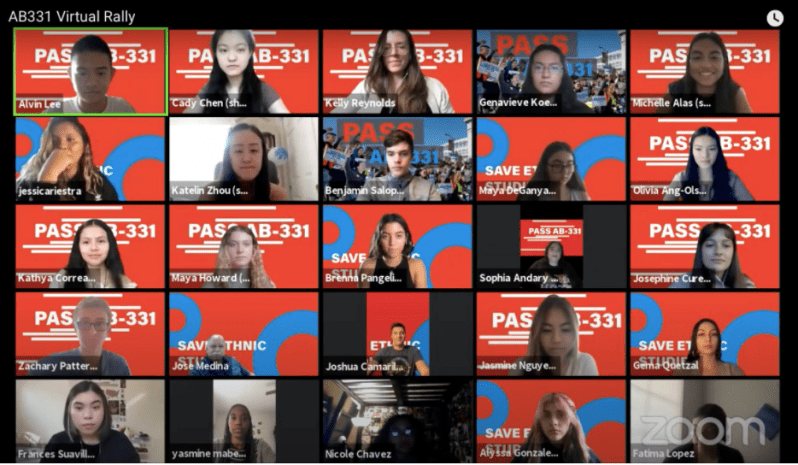Gov. Gavin Newsom’s (D-Calif.) veto of AB 331, a bill mandating ethnic studies as a high school graduation requirement in California, came as a surprise to student activists across the state and within the Stanford community. Now Stanford students are regrouping and planning new advocacy efforts to get the bill signed into law.
Diversity and inclusion in school curriculum has long been a part of the dialogue on Stanford’s campus. In 2014, a coalition founded by students called Who’s Teaching Us brought a list of demands to Stanford’s administration, sharing concerns related to faculty diversity and the University curriculum. Amid the recent resurgence of the Black Lives Matter movement, Stanford students have continued to expand this conversation, turning their focus outward towards the greater California community. Diversify Our Narrative, an initiative co-founded by Jasmine Nguyen ’23 and Katelin Zhou ’23, set out to do just that, aiming to increase the literature and voices of people of color in high school curricula.
Zhou and Nguyen took to social media to start Diversify Our Narrative last summer. Now boasting over 145,000 followers on Instagram, the organization has grown into a national grassroots campaign.
“We have a lot of chapters pushing for all sorts of… racial equity proposals now,” Zhou said.
“We’re very people powered,” Nguyen added. “That’s something we’re very proud of.”
In their efforts to pass AB 331, the organization joined forces with GenerationUp, a California-based student activist coalition for education equality. GENup harnessed the youth organizational support of Diversify Our Narrative, along with March for Our Lives California, to try to create momentum surrounding the bill. It worked: The petition for AB 331 gained over 20,000 signatures in five days according to Nguyen and Zhou.
The California State Senate passed AB 331 and presented it to the governor in mid-September. “We all thought it was going to pass,” said Alvin Lee, founder of GENup. “It felt like all the stars had aligned.”
Why wasn’t the bill signed into law?
Newsom suggested that more work go into the ethnic studies model curriculum, a separate document that aims to guide future ethnic studies courses if the bill is adopted. The proposed course content became a disputed topic across the state: Over 80 Jewish organizations expressed opposition toward the curriculum. Jewish groups cited an undermining of the legitimacy of a Jewish state and failure to include the narratives of non-Arab groups in the Middle East.
“I think the goal [of the bill] is great,” said Zohar Levy ’22, vice president of Stanford’s Jewish Student Association. (Levy has written for The Daily’s opinions and Grind sections.) “We should talk about celebrating diversity… but this program doesn’t address the fact that antisemitism is a huge issue.”
Assemblymember Jose Medina, who authored the bill, agreed with many of the concerns from the Jewish community in an interview with The Daily. In 2019, he held the bill back a year to allow for improvements to the curriculum.
“We could not have in the state of California any kind of curriculum that had anything antisemitic in it,” Medina said. He believed, however, that the proposed curriculum was “much improved” from last year’s version.
“Trying to create a curriculum that is inclusive of so many diverse cultures in California’s public schools [for] just a 50-minute class period… for one semester… is a really, really hard task,” Lee said.
As a former public school history teacher, Medina said he recognizes the importance of an ethnic studies curriculum. “It was pretty clear to me that the history of people of color wasn’t very well represented in our U.S. history books,” Medina said. “When I got to teach ethnic studies… I saw how powerful it is when students of color get to see themselves in the curriculum… all of a sudden [they] get turned on to learning.”
Student activist groups hope to see the bill reintroduced in the next legislative cycle.
“We’re going to check to make sure [the updated curriculum] … is representative of the communities being discussed,” Nguyen said. While Diversify our Narrative is still regrouping with March for Our Lives California and GenUp, the founders see a town hall, rallies and phone banking in their future.
Even though an official plan of action is still in the works, the organizers remain committed to their cause. “It’s really important to highlight and acknowledge the organizers who came before us alongside the organizers who are currently with us,” Nguyen said.
Lee presented a similar sentiment on behalf of GENup, saying simply “We’re just gonna try again.”
Contact Marli Bosler at mbosler ‘at’ stanford.edu and Jonny Zients at jzients ‘at’ stanford.edu
